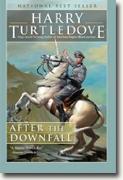After the Downfall
Harry Turtledove
book reviews:
· general fiction
· chick lit/romance
· sci-fi/fantasy
· graphic novels
· nonfiction
· audio books
· author interviews
· children's books @
curledupkids.com
· DVD reviews @
curledupdvd.com
newsletter
win books
buy online
links
home
for authors
& publishers
for reviewers

 |
After the Downfall Harry Turtledove Night Shade Books Hardcover 350 pages September 2008 |
|
Alternate history master Harry Turtledove’s After the Downfall
“So plunk your ass down on the rock and see what happens,” the sergeant advised.Hasso takes Edelsheim up on his suggestion, and is transported to another world. Before Edelsheim can follow suit, a Soviet submachine gun kills him. Although it’s a new world for him, Hasso has use for the weapon he’s brought along with him, his Schmeisser pistol. He sees a tall, beautiful blonde woman running from a mob of short, swarthy people armed with pitchforks, hatchets, and carving knives, and he opens fire. Hasso kills all of the pursuers, and the thankful woman, Velona, whom he learns soon afterward is also a goddess (or at least possessed at times by a goddess), has sex with him in gratitude right there, literally “in the middle of the road.” He thinks it’s rather strange behavior, but he’s not about to turn such an offer down: You’re a hero, pal. Here’s your reward. Beats hell out of the Knight’s Cross, doesn’t it? Even with Swords and Oak Leaves.In this land of primitive technology, the ruling people (the Lenelli) seem to be the Aryan ideal - tall, strong, blond-haired and blue-eyed people. They also know how to use magic - at any rate, the few wizards among them can - and they view anyone from any other race around (such as the Grenyes, who had been dispatched by Pemsel and can’t use magic) as inferior and “mindblind.” At first, being the lover of a goddess and then becoming the advisor and security officer of Bottero, the king of the Lenellis where he has been transported to, is totally fine with Pemsel. Sure, it’s stinky - modern plumbing and waste disposal hasn’t been invented there yet - and he has to prove his fighting skills and worth to men who are bigger and stronger than he is, but, it has its benefits: he’s alive, and Velona is a passionate lover. He also possesses skills in the martial arts that he’s been taught as a German soldier and has knowledge of military tactics that the Lenellis have never heard of before. Hasso has nothing personal against the Grenyes, but he views them as a less intelligent, inferior race of people, comparing them in his mind to various groups of people from his own world, like Russians, Slavs, American Indians and Jews. The Lenelli despise the Grenyes and think they’re only good as slaves, for sexual purposes, or dead. Hasso pledges loyalty to King Bottero and to aid him in conquering the Grenyes in the neighboring land of Bucovin, where for some odd reason magic seems to be almost totally ineffective the farther one travels into the region. Turtledove doesn’t portray Nazism or racial hatred in a good light. It is, of course, the opposite: Hasso Pemsel gradually begins to realize that the short, swarthy Grenyes - and, by extension, the Russians, American Indians, Slavs, and Jews from his own world and time - are just as human and intelligent as anyone else. It takes his being captured by the Grenyes and being coerced into cooperating with them to bring the point home, as well as learning their language, but it eventually dawns on him that the idea of racial superiority and inferiority is nonsense on the face of it. After the Downfall This novel is a fascinating, page-turning read, one of Turtledove’s best. It’s not strictly an alternate-history novel but an excellent combination of reality and fantasy, and highly recommended. Originally published on Curled Up With A Good Book at www.curledup.com. © Douglas R. Cobb, 2009 |
|
|
|
 Click here to learn more about this month's sponsor! |
|
| fiction · sf/f · comic books · nonfiction · audio newsletter · free book contest · buy books online review index · links · · authors & publishers reviewers |
|
| site by ELBO Computing Resources, Inc. | |
 The Nazi in question is Wehrmacht officer Captain Hasso Pemsel, who finds himself on the losing end of the greatest war in history – WWII, cornered with the few people left alive in his company “in the ruins of the Old Museum” in Berlin by the Russians. As in another novel I’ve reviewed for this site, The Otherworldlies, Turtledove’s novel uses the infamous Omphalos Stone as a plot device to miraculously teleport someone from point A to point B. As Hasso reads an inscription upon the stone about its history, a soldier named Sergeant Edelsheim sarcastically suggests that Hasso should try to sit on it and see what happens:
The Nazi in question is Wehrmacht officer Captain Hasso Pemsel, who finds himself on the losing end of the greatest war in history – WWII, cornered with the few people left alive in his company “in the ruins of the Old Museum” in Berlin by the Russians. As in another novel I’ve reviewed for this site, The Otherworldlies, Turtledove’s novel uses the infamous Omphalos Stone as a plot device to miraculously teleport someone from point A to point B. As Hasso reads an inscription upon the stone about its history, a soldier named Sergeant Edelsheim sarcastically suggests that Hasso should try to sit on it and see what happens: